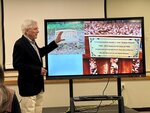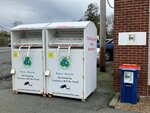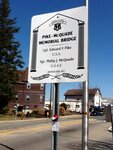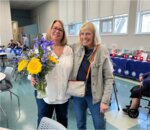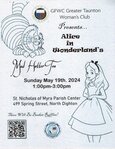George F Mueden Jr.
George F Mueden Jr., died peacefully on April 13, 2021 at Evergreen House Nursing and Rehabilitation Center in East Providence, RI. He was eight days shy of 104 years old. He never married, had no children and is survived by a handful of cousins of the families Dennison, Mueden and Moritz.
George was born on April 21, 1917 to Margaret Dennison Mueden and George F. Mueden, who lived on New York's Upper East Side. He developed an early interest in engineering through his father, a transit engineer, who worked on the construction of New York City's underground subway system.
As a young man, George was invited to travel to Europe on the Queen Mary with his Aunt Mathilde Mueden Leisenring, a respected portrait artist and active member of the Arts Club in Washington, DC. Her "Portrait of a Young Boy" (George as a toddler) painted in 1920, hangs at the club. That early travel adventure with his aunt opened the door to a lifelong interest in the visual arts, music and travel. He gifted his extensive collection of her paintings to the The Arts Club in 2010 which formed a featured exhibition that year. A permanent room of her paintings is maintained there.
Following in his father's footsteps, George graduated with a degree in Engineering from Cornell. He then joined the Army Corps of Engineers where he was assigned to work on the Panama Canal. In 1943, while working on the canal, he lost a leg in a collision between two nine-and-a-half ton tractors.
During World War II he joined the Civil Defense Ground Observer Corps, where he volunteered to take the night shift, watching over darkened New York City using binoculars to spot incoming enemy fighter planes. It was under the night sky on the rooftops of New York skyscrapers that he met fellow volunteer, Louise Marshall.
Although they never married, they were lifelong partners who regularly traveled around Europe. Louise was proficient in Italian, so many of their trips soon gravitated to Italy, where George fell in love with Venice. Until his passing, he stayed in weekly telephone contact with his friend Erla Zwingle, a writer for National Geographic, whom he had met in Venice, where she had settled following an assignment there.
After the war, George spent a number of years at New York's Cornell Club, where he assisted Cornell alumni with job placements.
In his early 60s, when TRS-80 computers first became available, George, learned to code and program, and became an active member of the Manhattan Computer Club. By the 1980s, he was chairing the club's computerized investment group, where he met Tobey Sanford, a photojournalist and fellow investing enthusiast, with whom he maintained a close friendship until his death.
As George's eyesight deteriorated due to glaucoma and cataracts in the 2000s, he began advocating for the accessibility of documents and the Web to those with low vision. Through these efforts, he developed an ongoing friendship with Aries Arditi, a vision scientist, then at Lighthouse International (now Lighthouse Guild). George was active online until his last years, even on Twitter, and maintained remarkable mental acumen, insight and memory until his last days.
Throughout his later years, he turned his attention to philanthropy. He was a gifted investor and turned a guidance counselor's salary into a small fortune day trading on his computer. He gave generously to many non-profits, including the Food Bank of NYC and the Inner-City Scholarship Fund and would shower his family members, near and far, with large checks without warning.
At 97, he was lured by the friendship of his cousin, Frances Dennison, and the support of her son, Dr. Allen Dennison, to leave his NYC apartment and move to a retirement community where she was living in Providence, Rhode Island.
As George's 100th birthday approached, he decided to celebrate with a trip to his much-loved Venice. Despite his friends' concerns about a one legged man with limited vision and hearing, he managed to plan and make this trip alone, without plunging into the Grand Canal.
Until his death, he continued his advocacy for low vision, maintained his interest in computerized investing and enjoyed following events in Venice. Mr. Mueden harbored a longstanding affection for the Veteran's Administration for his fine care and rehabilitation, for the Government of the United States for support of his schooling at Cornell University by the GI Bill, and for the City and State of New York. To his death, he idealistically viewed the above governmental bodies as instruments of compassion for the injured and poor. His will, to the miffed admiration of his family, specified no bequest to them and approximately 36 % to the federal government, 18 % each to New York City and New York State, unrestricted, to reduce debt. He disapproved of public debt and, at the end, put his money where his mouth was-- to the tune of between one to two million dollars.
His cremated remains are to be interred in the Mueden family plot at Prospect Hill Cemetery, Washington, DC at a private gathering of family and friends at future date and his name added to a marker under that of his brother, Edward, who was killed in Belgium in the Battle of the Bulge, 1944. More information on his life and opportunity to comment can be found at livejournal.com (search: "mueden")

